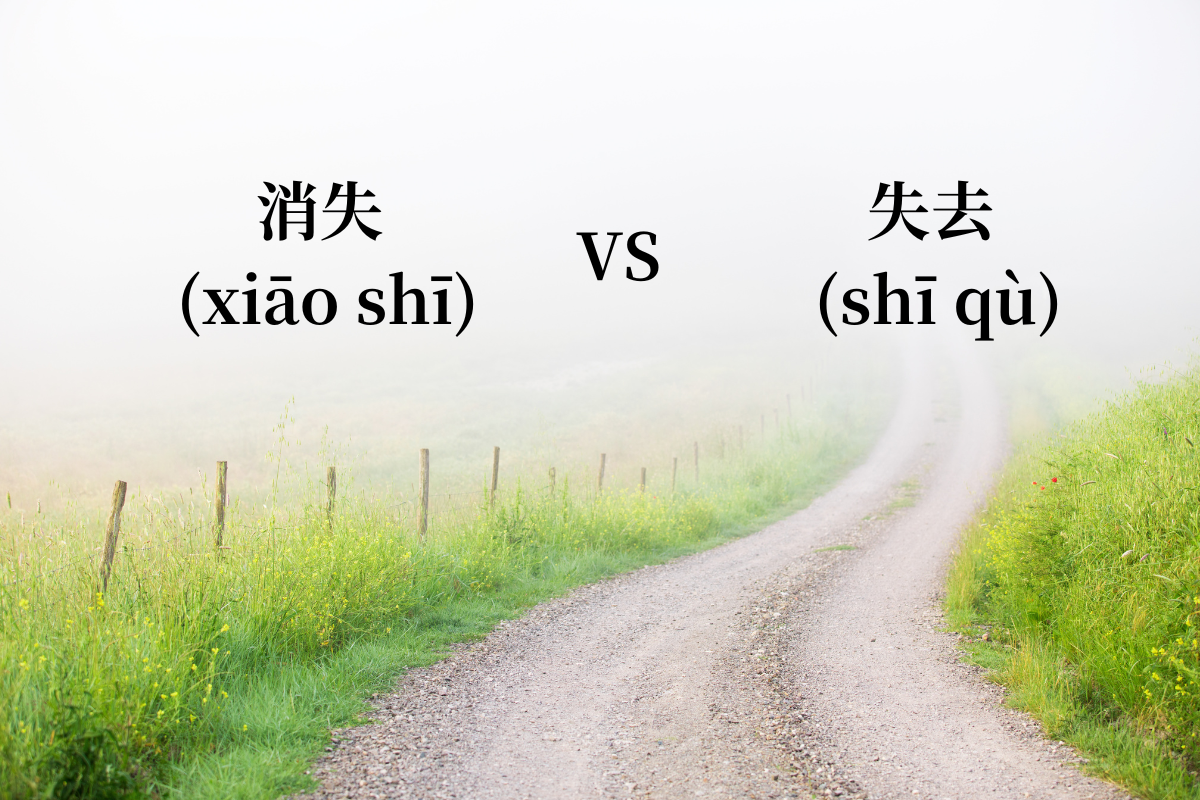HSK 5 Words: 消失 (xiāo shī) VS 失去 (shī qù)
In Chinese language learning, the words 消失 (xiāo shī) and 失去 (shī qù) are often used interchangeably by learners, but they possess subtle differences in meaning and usage. This article aims to clarify the distinctions between these two words through exploring their definitions and examples of application.

消失 (xiāo shī) primarily refers to the complete vanishing or disappearance of something, often in a sudden or gradual manner. It emphasizes the absence of an object or phenomenon, as if it had never existed.
Examples:
- The raindrops disappeared as the sun came out.
雨滴随着太阳的出现消失了。
yǔ dī suí zhe tài yáng de chū xiàn xiāo shī le. - The old building has disappeared, replaced by a modern skyscraper.
那座老建筑消失了,取而代之的是一座现代化的摩天大楼。
nà zuò lǎo jiàn zhù xiāo shī le, dài tì qí de shì yī zuò xiàn dài huà de mó tiān dà lóu. - The smile on her face disappeared when she heard the news.
她脸上的笑容在听到消息时消失了。
tā liǎn shàng de xiào róng zài tīng dào xiāo xī shí xiāo shī le.
失去 (shī qù), on the other hand, often implies the loss of something valuable, either physically or emotionally. It suggests a sense of sadness or regret due to the absence of something once possessed.
Examples:
- He lost his wallet on the bus.
他在公交车上失去了钱包。
tā zài gōng jiāo shàng shī qù le qián bāo. - The pain of losing a loved one kept him in the shadows for a long time.
失去亲人的痛苦让他长时间无法走出阴影。
shī qù qīn rén de tòng kǔ ràng tā cháng shí jiān wú fǎ zǒu chū yīn yǐng。 - He gave up on that important project because he lost confidence.
他因为失去信心而放弃了那个重要的项目。
tā yīn wèi shī qù xìn xīn ér fàng qì le nà gè zhòng yào de xiàng mù。
In summary, 消失 (xiāo shī) and 失去 (shī qù) are two distinct words in Chinese. 消失(xiāo shī) emphasizes the vanishing or disappearance of something, while 失去(shī qù) focuses on the emotional or material loss of something once possessed. Understanding the nuances of these words and their appropriate usage can enhance your Chinese language proficiency and communication skills.
Quiz: Please consider whether to use 消失 (xiāo shī) VS 失去 (shī qù) in the following sentences.
- 那个古老的村庄已经______在历史的长河中。
nà gè gǔ lǎo de cūn zhuāng yǐ jīng ______ zài lì shǐ de cháng hé zhōng. - 他______了与好友的联系,感到十分遗憾。
tā ______ le yǔ hǎo yǒu de lián xì, gǎn dào shí fēn yí hàn. - 随着时间的流逝,那些美好的回忆逐渐______了。
suí zhe shí jiān de liú shì,nà xiē měi hǎo de huí yì zhú jiàn ______ le。
Answer:
- 消失 (xiāo shī)
- 失去 (shī qù)
- 消失 (xiāo shī)